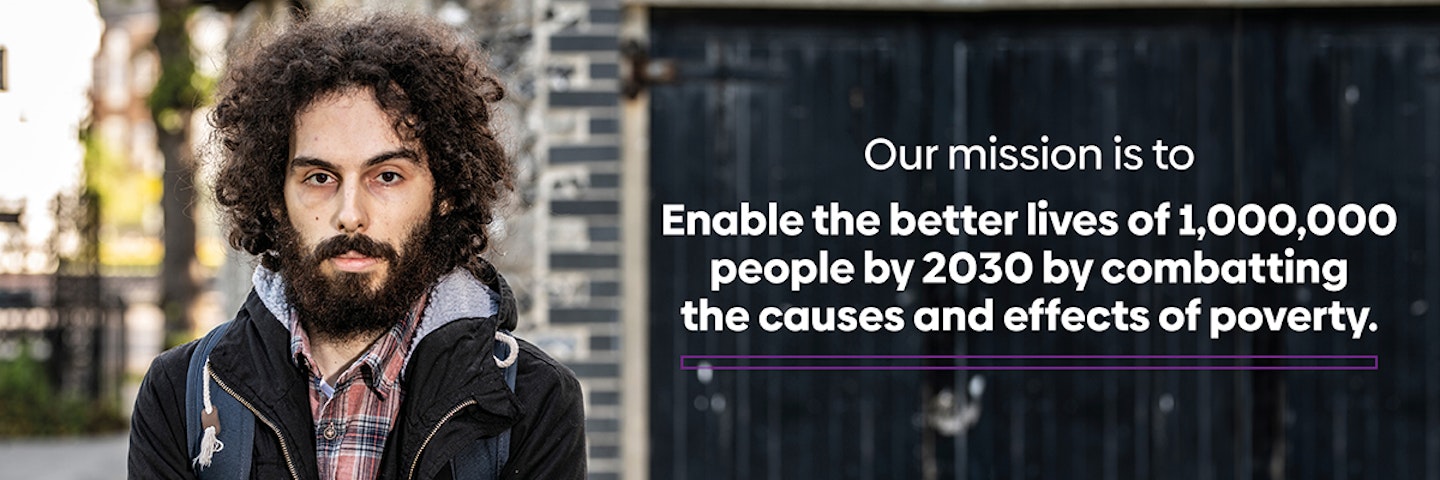Mental Wellness
We are working with businesses, colleagues and our communities to train and educate people on mental wellness and resilience.
more
We are working with businesses, colleagues and our communities to train and educate people on mental wellness and resilience.
moreWe are helping those who are out of work to increase their confidence and skills and to connect them with their purpose.
moreWe are helping people to have a healthier relationship with money through providing practical guidance and emergency support.
moreWe are building businesses to change the world through our social incubator, inc
moreOur work in the community focuses on the three biggest causes and effects of poverty: mental wellness and social connections, employment, and financial inclusion
Our social incubator inc. works with those who want to tackle the root cause of poverty in creative and innovative ways
Our social research gives a voice to those experiencing poverty - so we know what to do, where and how to do it.
Being in poverty means different things to different people; and that’s one of the main reasons why there are so many ways of measuring or defining it. Definitions can rely on information about people’s incomes, or housing costs, and some talk about material essentials or experiences people need for a decent standard of living. Which is why our research will be so important in giving those experiencing poverty a voice.
Experts are however in agreement, that poverty exists when people lack the means to satisfy their basic needs across the following areas and these are the areas we work across in partnership with our largest donor, Aster Group:
• Employment/ work
• Money/ financial
• Mental wellness or social connections
• A home.
With strong links between social housing and poverty with *46% of social renters living in relative poverty in 2019/20, compared to 11% of those who have a mortgage, or even 33% who were private renters (Poverty in the UK: statistics - House of Commons Library (parliament.uk) partnering with Aster Group is a natural fit to ensure our services reach those most in need.
Mental wellness and social connectivity
There is a strong connection between people on lower incomes and the likelihood of developing and experiencing mental health problems. According to the Mental Health Foundation, children and adults living in households in the lowest 20% income bracket are two to three times more likely to develop mental health problems than those in the highest. Those on housing benefit are more than twice as likely to have a common mental health problem than those not receiving it (35.1% vs 14.9%).
We’ve created a programme of support to address this and have an experienced psychotherapist who leads our growing work in this area, supported by our expert associates and skilled volunteers.
We’re working to improve the mental wellness and social connectivity of 400,000 people by 2030.
Financial Inclusion
Being worried about money can impact your physical and mental health. Financial wellbeing means having the knowledge and confidence to make the most of your money. Both on a day-to-day basis, and through planned and unplanned events.
We are working to improve the financial wellbeing of 300,000 people by 2030 by providing guidance and access to support.
Employment
Although paid employment does reduce the risk of poverty compared to being unemployed; according to the Joseph Rowntree Foundation, in-work poverty has risen to 56% of people in poverty overall. This means that work programmes or initiatives which simply focus on moving people out of unemployment, into work, are not having the same impact on poverty rates, or people’s overall quality of life as they used to.
The Mental Health Foundation reports that employment status is also linked to mental health outcomes, with those who are out of work having higher rates of common mental health problems than those employed.
The Aster Foundation has created a range of initiatives people can access that will help them into work, find higher paid or more secure work, increase their earning potential or aspirations and lower the costs associated with working.
We’re improving the chance of employment for 300,000 people by 2030 by working to remove the barriers that exist.
If you would like to become a corporate supporter or find out more about our work please get in touch and we’ll get back to you as soon as we can.
I want to know more